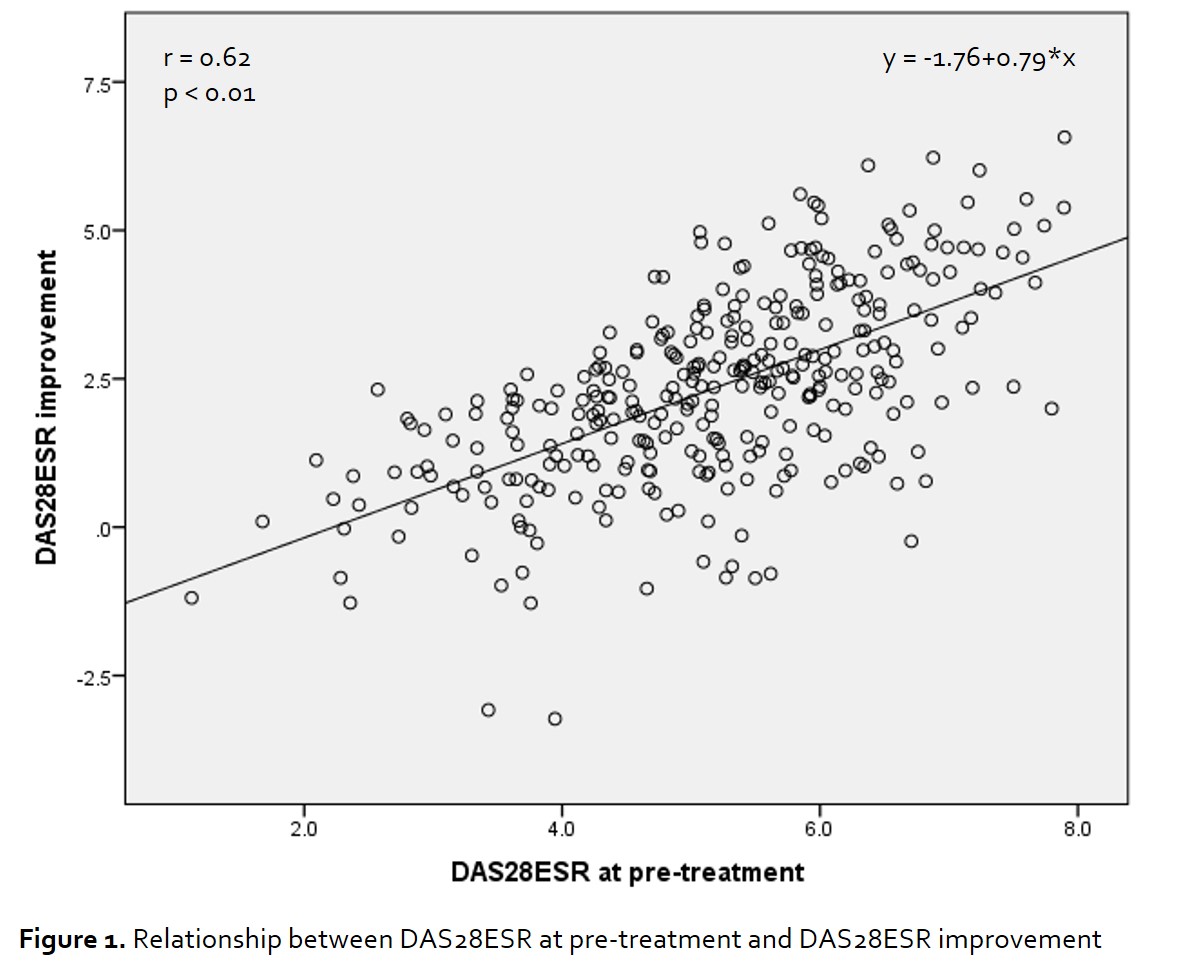Session Information
Date: Sunday, November 8, 2015
Title: Rheumatoid Arthritis - Small Molecules, Biologics and Gene Therapy Poster I
Session Type: ACR Poster Session A
Session Time: 9:00AM-11:00AM
Background/Purpose:
Anti-citrullinated protein antibody (ACPA) has been an important marker in diagnosing rheumatoid arthritis (RA). Its predictive value remains unclear; therefore, here we investigated whether the pre-treatment ACPA titer is able to predict the treatment efficacy of first biological treatments in RA.
Methods:
Records of relevant patients with RA were collected from the Tsurumai Biologic Communication Registry, wherein the department of Nagoya University and 20 affiliated hospitals in Japan are enrolled. The relevant data of a total of 388 patients with RA who met the 2010 ACR–EULAR classification criteria for RA were completely recorded in regard to DAS28ESR before and after biological treatment. The ACPA status was divided into three categories: negative (0‒4.4 U/ml), low-positive (4.5‒13.5 U/ml), and high-positive (>13.5 U/ml). The 154 ACPA low-positive patients and 172 ACPA high-positive patients were compared with regard to the effect of ACPA titer on biological treatment. Only bio-naïve patients were included in this study, whereas patients who received second or latter biological treatment were excluded. We analyzed the relevant data using analysis of covariance (ANCOVA) with pre-treatment DAS28ESR as covariant.
Results:
The demographic characteristics of each group at baseline are presented in Table 1. Pre-treatment DAS28ESR was significantly associated with DAS28ESR improvement, where the higher pre-DAS28ESR, the larger DAS28ESR improvement (p < 0.01; Figure 1). Pre-treatment DAS28ESR was 5.11 in ACPA low-positive patients and 5.25 in ACPA high-positive patients, and DAS28ESR improvement in the two groups was 2.49 and 2.22, respectively. Compensating each DAS28ESR according to the pre-biological treatment value using ANCOVA as the whole mean value, which is 5.19, DAS28ESR improvement was 2.54 in ACPA low-positive patients and 2.17 in ACPA high-positive patients, respectively, and the difference was significant (p < 0.05; Table 2).
Conclusion:
The ACPA titer significantly affected DAS28ESR improvement after first biological treatment. In addition, the efficacy of first biological treatment was inferior in ACPA high-positive patients compared with that in ACPA low-positive patients with RA.
To cite this abstract in AMA style:
Ogawa Y, Takahashi N, Funahashi K, Asai S, Takemoto T, Watanabe T, Asai N, Ishiguro N, Kojima T. Titer of Anti-Citrullinated Peptide Antibody Affects the Efficacy of First Biological Treatment in Rheumatoid Arthritis [abstract]. Arthritis Rheumatol. 2015; 67 (suppl 10). https://acrabstracts.org/abstract/titer-of-anti-citrullinated-peptide-antibody-affects-the-efficacy-of-first-biological-treatment-in-rheumatoid-arthritis/. Accessed .« Back to 2015 ACR/ARHP Annual Meeting
ACR Meeting Abstracts - https://acrabstracts.org/abstract/titer-of-anti-citrullinated-peptide-antibody-affects-the-efficacy-of-first-biological-treatment-in-rheumatoid-arthritis/



